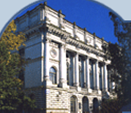Pavel Andreevich Zhilin was the Head of the Department of
Theoretical Mechanics at Saint Petersburg Polytechnical
University, Head of the laboratory “Dynamics of Mechanical
Systems” at the Institute for Problems in Mechanical Engineering
of Russian Academy of Sciences, member of the Russian National
Committee for Theoretical and Applied Mechanics, member of the
International Society of Applied Mathematics and Mechanics (GAMM),
member of Guidance Board Presidium for Applied Mechanics Ministry
of Higher Education RF, full member of Russian Academy of Sciences
for Strength Problems. He was an author of more than 200
scientific papers, monographs “Second-rank Vectors and Tensors in
3-dimentional space” (2001), “Theoretical mechanics: fundamental
laws of mechanics” (2003). Sixteen PhD theses and seven
Professorial theses were defended under his supervision.
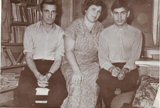 P.A. Zhilin
was born on February 8th, 1942, in the town of
Velikiy Ustyug in Vologda region, where his family found
themselves during the war. P.A. Zhilin
was born on February 8th, 1942, in the town of
Velikiy Ustyug in Vologda region, where his family found
themselves during the war.
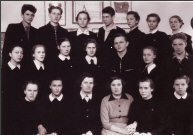 P.A. Zhilin was born on February 8th, 1942, in the town of
Velikiy Ustyug in Vologda region, where his family found
themselves during the war. Pavel Zhilin spent his childhood in the
towns of Volkhov and Podporozhie, where his father, Andrey
Pavlovich Zhilin, worked.
Andrey P. Zhilin was a power engineering specialist, and at that
time the chief engineer at the coordinated hydroelectric system of
Svir river. Zoya Alexeevna Zhilina, mother of Pavel A. Zhilin, was
bringing up the sons and kept the house. In 1956 Andrey P. Zhilin
was assigned to the position of the chief power engineering
specialist at the Soviet Union Trust “HydroElectroMontage”, and
the family moved to Leningrad.
P.A. Zhilin was born on February 8th, 1942, in the town of
Velikiy Ustyug in Vologda region, where his family found
themselves during the war. Pavel Zhilin spent his childhood in the
towns of Volkhov and Podporozhie, where his father, Andrey
Pavlovich Zhilin, worked.
Andrey P. Zhilin was a power engineering specialist, and at that
time the chief engineer at the coordinated hydroelectric system of
Svir river. Zoya Alexeevna Zhilina, mother of Pavel A. Zhilin, was
bringing up the sons and kept the house. In 1956 Andrey P. Zhilin
was assigned to the position of the chief power engineering
specialist at the Soviet Union Trust “HydroElectroMontage”, and
the family moved to Leningrad.
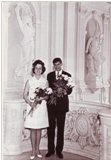 The elder brother, Sergey
Andreevich Zhilin, followed in his father's footsteps, became an
engineer and now participates in creating high-voltage electric
apparatus.
The elder brother, Sergey
Andreevich Zhilin, followed in his father's footsteps, became an
engineer and now participates in creating high-voltage electric
apparatus.
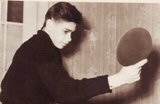 In 1959 P.A. Zhilin left the secondary school and
entered Leningrad Polytechnical Institute. Yet at school Pavel
Zhilin met his future wife, Nina Alexandrovna, who was his
faithful friend and helpmate all his life long. While studying at
the institute P.A. Zhilin became keen on table tennis and was a
captain of the student and later institute team for many years.
Not once did the team win different student and sport collectives
championships. P.A. Zhilin got a qualification of the candidate
master of sports (the highest qualification in this sport
discipline at that time).
In 1959 P.A. Zhilin left the secondary school and
entered Leningrad Polytechnical Institute. Yet at school Pavel
Zhilin met his future wife, Nina Alexandrovna, who was his
faithful friend and helpmate all his life long. While studying at
the institute P.A. Zhilin became keen on table tennis and was a
captain of the student and later institute team for many years.
Not once did the team win different student and sport collectives
championships. P.A. Zhilin got a qualification of the candidate
master of sports (the highest qualification in this sport
discipline at that time).
In the period of 1959-1965 P.A. Zhilin studied at Leningrad
Polytechnical Institute in the Department of “Mechanics and
Control Processes” at the Faculty of Physics and Mechanics. Later
on his daughter, Olga Zhilina, graduated from the same Department.
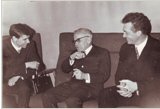 After graduation, P.A. Zhilin got a qualification of
engineer-physicist in “Dynamics and Strength of Machines”
speciality, and from 1965 to 1967 worked as an engineer at water
turbine strength department in the Central Boiler Turbine
Institute. In 1967 he accepted a position of Assistant Professor
at the Department of “Mechanics and Control Processes”, later he
worked there as a senior researcher, an Associate Professor and a
Full Professor.
After graduation, P.A. Zhilin got a qualification of
engineer-physicist in “Dynamics and Strength of Machines”
speciality, and from 1965 to 1967 worked as an engineer at water
turbine strength department in the Central Boiler Turbine
Institute. In 1967 he accepted a position of Assistant Professor
at the Department of “Mechanics and Control Processes”, later he
worked there as a senior researcher, an Associate Professor and a
Full Professor.
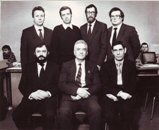 The founder of the Chair was Anatoliy Isaakovich
Lurie, Doctor of Technical Sciences, Professor, corresponding
member of USSR Academy of Sciences, world-famous scientist.
P.A. Zhilin became the closest disciple of A.I. Lurie and spent
many hours working together with him. Scientific ideology of
P.A. Zhilin was developing to a great extent under the influence
of A.I. Lurie. P.A. Zhilin got his PhD degree in Physical and
Mathematical Sciences in 1968 (the topic of his thesis was “The
theory of ribbed shells”), Professor of Physical and Mathematical
Sciences since 1984 (the topic of his Professorial thesis was
“The theory of simple shells and its applications”), Professor
at the Department of “Mechanics and Control Processes” since
1989.
The founder of the Chair was Anatoliy Isaakovich
Lurie, Doctor of Technical Sciences, Professor, corresponding
member of USSR Academy of Sciences, world-famous scientist.
P.A. Zhilin became the closest disciple of A.I. Lurie and spent
many hours working together with him. Scientific ideology of
P.A. Zhilin was developing to a great extent under the influence
of A.I. Lurie. P.A. Zhilin got his PhD degree in Physical and
Mathematical Sciences in 1968 (the topic of his thesis was “The
theory of ribbed shells”), Professor of Physical and Mathematical
Sciences since 1984 (the topic of his Professorial thesis was
“The theory of simple shells and its applications”), Professor
at the Department of “Mechanics and Control Processes” since
1989.
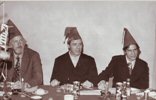 In 1974-1975 P.A. Zhilin worked as a visiting researcher at
the Technical University of Denmark. While working in the
Department of “Mechanics and Control Processes”, P.A. Zhilin
delivered lectures on analytical mechanics, theory of
oscillations, theory of shells, tensor analysis, continuum
mechanics. In 1988 he was invited in the Yarmuk University
(Jordan) to set a course of continuum mechanics at the Faculty of
Physics. At the same time P.A. Zhilin actively carried out
scientific work in the field of theory of plates and shells,
nonlinear rod theory, theory of elasticity, continuum mechanics.
He gained three certificates of invention in the area of
vibroinsulation and hydroacoustics, he was awarded with the
Inventor of the USSR insignia.
In 1974-1975 P.A. Zhilin worked as a visiting researcher at
the Technical University of Denmark. While working in the
Department of “Mechanics and Control Processes”, P.A. Zhilin
delivered lectures on analytical mechanics, theory of
oscillations, theory of shells, tensor analysis, continuum
mechanics. In 1988 he was invited in the Yarmuk University
(Jordan) to set a course of continuum mechanics at the Faculty of
Physics. At the same time P.A. Zhilin actively carried out
scientific work in the field of theory of plates and shells,
nonlinear rod theory, theory of elasticity, continuum mechanics.
He gained three certificates of invention in the area of
vibroinsulation and hydroacoustics, he was awarded with the
Inventor of the USSR insignia.
Since 1989 P.A. Zhilin was the Head of Department of Theoretical
Mechanics. In the period of his direction five of his colleagues
defended their Professorial theses, for the four of them
P.A. Zhilin was a scientific advisor. While working in the
Department of Theoretical Mechanics P.A. Zhilin stationed and read
original courses on tensor algebra, rational mechanics, and the
rod theory.
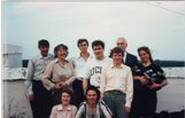 During this period of time Pavel Zhilin worked hard in
the field of investigating and developing foundations of
mechanics. His investigations on spinor motions in mechanics and
physics, phase transitions and phenomena of inelasticity,
electrodynamics from the positions of rational mechanics, logical
foundations of mechanics relate to this period. Since 1994 Pavel
Zhilin was the Head of “Dynamics of Mechanical Systems”
laboratory at the Institute for Problems in Mechanical Engineering
of Russian Academy of Sciences. Since 1999 he was a member of the
scientific committee of the Annual International Summer School -
Conference “Advanced Problems in Mechanics”, held by the
Institute for Problems in Mechanical Engineering.
During this period of time Pavel Zhilin worked hard in
the field of investigating and developing foundations of
mechanics. His investigations on spinor motions in mechanics and
physics, phase transitions and phenomena of inelasticity,
electrodynamics from the positions of rational mechanics, logical
foundations of mechanics relate to this period. Since 1994 Pavel
Zhilin was the Head of “Dynamics of Mechanical Systems”
laboratory at the Institute for Problems in Mechanical Engineering
of Russian Academy of Sciences. Since 1999 he was a member of the
scientific committee of the Annual International Summer School -
Conference “Advanced Problems in Mechanics”, held by the
Institute for Problems in Mechanical Engineering.
Pavel Andreevich Zhilin died on 4th of December, 2005. His track
has become a part of history of science.
It is difficult to
overestimate his influence on his disciples, colleagues, and all
who were lucky to know him personally. He had an extraordinary
ability to inspire interest to science, to give you a fresh
unexpected look at the world around. P.A. Zhilin was a man of
heart, a responsive, kind person, who found time for everyone,
always giving his full support and benefit of his wise advice. One
was amazed by his remarkable human qualities, his absolute
scientific and human honesty. Being his disciples we are grateful
to life for the chance to have known such a wonderful person and
an outstanding scientist, who became for us an embodiment of
spirituality.
|
